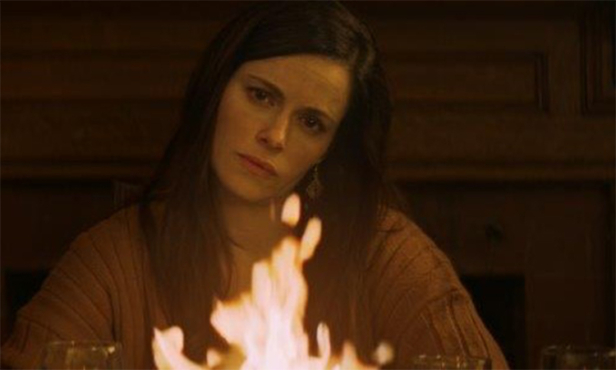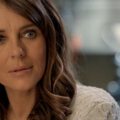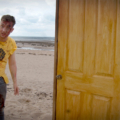The narrative proper will begin with new mother Meredith (Emily Hampshire) limping painfully to the threshold of that same house with her husband Jared (François Arnaud), as they bring their baby son Alex (Élouan Quesnel Vallières) back from the hospital where he was just born. “I can’t believe all that came out of me,” Meredith will say of the pool of liquid still lying on the kitchen floor from when her waters broke. “But then look what came after!”
For now, Meredith is thrilled in her new rôle as mother, but as the days and weeks go by, Mom will foreground the negative aspects of maternity: the uterine prolapse, the difficult feeds, the exhaustion, the isolation, the irritation, the endless need to express milk and the complete loss of autonomy. From the start, it is clear that Meredith and Jared are very much in love and looking forward to this new adventure in parenthood, but as Jared starts going to work again, and Meredith is left alone with little Alex in the house, cracks start to appear in the walls of their relationship.
With both her parents dead and her sister Katherine (Erika Rosenbaum) visiting only occasionally, Meredith is without support or a break, and the pressures start taking their toll. “She’s erratic, seeing things, yelling, violent,” Jared complains to the doctor (Mariah Inger) whom they are seeing for counselling. Meredith is clearly coming apart at the seams, and it is not long before she is hearing voices, seeing – or at least dreaming – an older, no longer infant version of Alex (indeed the boy glimpsed in the prologue) and another, sinister feminine entity (Valérie Doucet) in the house with her, even as she ideates, vividly and repeatedly, the death of her own baby. Whether this is an infiltration from without by a malign supernatural presence, or, like her broken waters, is all coming from inside of her, Meredith is going to have to take her doctor’s advice, count to ten and face both her monster and reality.
“Am I a bad mother?” is a re-echoing line that haunts director Adam O’Brien’s film, scripted by Philip Kalin-Hajdu from an original idea by Tyler Sardoni. Like Brandon Christensen’s Still/Born (2017), Michell Garza Cervera’s Huesera (2022) and James Byrd’s Adalynn (2023), Mom uses genre tropes to show post-partum depression from the inside, while like Jennifer Kent’s The Babadook (2014), it reifies madness as a monster that mother and son fight (and feed) together.
Meredith’s traumatic experience becomes an endless, cycling trap, lived and relived without escape, as the film shifts into ever more irrational territories and merges the fracturing interiorities of home and housewife alike. This sends the viewer seeking a hidden tragedy that you hope beyond hope is mere delusion, even as the reality of the situation becomes impossible to deny. Here, the familiar, almost comfortable routines of horror are deployed both to conceal, and gradually to expose, an underlying fate that is truly harrowing, as we realise that some doors ought never – but are eternally destined – to be opened, whether in the end or the beginning, ready or not.
Mom had its world première at the Glasgow FrightFest 2024.




